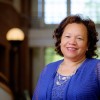This article is more than 5 years old.
The final SOLINET annual meeting is being held in Atlanta Thursday and Friday morning at the Georgia Tech Hotel & Conference Center. The SAMM 09 conference entitled, the Changing World, Changing Libraries featured as open keynoter the Executive Director and Senior Futurist at the DaVinci Institute, Dr. Tom Frey. Frey thinks our society is always looking backward to move forward. Frey soon shifted his thoughts to a hand held device that could be used as a shopping aid. Whenever someone you see with a cool pair of boots you could simply just point and click. Your handheld device finds it, in your size and if you choose to, it could be delivered to your door. Or how about a musical devise attached to your glasses inserted near the ears. This device selects the type of music you need to hear based on your mood and your reaction to previously played songs. In 2059 what form of payment will be used? Will it be from a chip on your finger or will it be from a scan of your eyes? In what year Frey ask, will the last book be printed? He predicts the kindle will sell for about $20 within the next few years. He thinks that libraries should become electronic outpost, equipped with multi searching stations and staffed with roving librarians.Within the next twenty years libraries will contain no books. The model for education will be completely revamped. It will be more of an itunes model. The transition will move away from teaching towards actual learning. This year MIT Open Course ware offered 1800 courses and Moodle 2,918,000 consortium courses. Courseware will be developed everywhere, real not just in an online environment, less dependent on teachers and schools. Libraries should become laboratories for the creation of new courses. They should embrace their role as the search command center, a place where folk come to get help identifying the appropriate databases to search in. Communities in the future will be developed around ways people can meet other people, empires of one.
Forty five million people currently are doing all or part of their jobs at home. People who work at home suffer from two things, isolation and distraction. Suppose libraries were designed to serve folk who work from home. What might they have? Well for one thing, perhaps day care centers or remote office space, art studios, mini planetariums and recreation centers. I must admit I loved the walk station. A computer with a treadmill attached. With this device you can type away on your computer while you get your twenty minute workout. Libraries could also offer expert series. This is a panel of experts formed to discuss and answer questions on a particular topic. Libraries should be about reaching out to communities and extending influence. Frey suggest using weekly online newsletters to acquaint the community of the library receipts, statistics and upcoming events.
For my second session I choose the Mass Digitization Collaborative. Designed to assist cultural heritage institutions with their digitization needs this initiative was a featured product from the legacy PALINET offices. It provides a service wherein libraries may ship off items to one of several scanning centers and have them digitized at a low cost. The cost of which could not be shared with the audience.
The luncheon speaker, author of Full of Grace, Dorothea Benton Frank shared humorous reflections on how she began her writing career down in Sullivan’s Island South Carolina. After lunch I attended “A Perfect Marriage: Advocacy & Fundraising.” Though the presenters asked for a show of hands of those representing academic libraries, they still choose to focus most of their message to public librarians. I did enjoy hearing 3M’s Dave Pointon, share with the audience their philosophy on service. They believe that the more successful libraries are the more successful 3M will be. The better libraries do in the community where we work and live, the easier it is to improve the quality of life around us and it also increases 3M’s ability to attract and retain a qualified workforce.
The final session of the day was the Lyrasis business meeting where Kate Nevins and others retold the path for SOLINET and PALINET to Lyrasis. They each spoke on the Lyrasis vision, to be more than what they each had been, offering improved library leadership, expansion of digital services, open source, cooperative collection management and re-energizied library operational planning. OCLC conducted a series of studies that showed that regional groups each had varying levels of service and pricing. They concluded that libraries needed more options and direct relationships. As a result of this, OCLC will offer libraries a choice, remain an affiliate of the regional groups such as Lyraris or go directly through OCLC. The first evidence of this new relationship was seen when OCLC dropped the service charge previously instituted by SOLINETfor pricingrelated to cataloging and interlibrary loan. In addition OCLC reduced compensation changes to the networks by almost 70%. The future seems most uncertain for Lyrasis, but if their commitment to member librariesremains at the highest levels and they continue tooffer the local touch, I think they will succeed.
